Editor's note: On the morning of November 12, the Ministry of Agriculture and Environment held the 80th Anniversary Ceremony of the Agriculture and Environment Sector and the 1st Patriotic Emulation Congress. General Secretary To Lam attended and delivered a speech at the Ceremony. Agriculture and Environment Newspaper respectfully publishes the full text of the General Secretary 's speech.
Dear leaders and former leaders of the Party, State and Vietnam Fatherland Front;
Dear delegates, distinguished guests, and international friends;
Dear comrades, officials, civil servants, employees and workers of the Agriculture and Environment sector.
Today, in the exciting emulation atmosphere of the entire Party, people and army, we are striving to successfully complete the goals and tasks of the XIII Congress term and carefully prepare for the XIV National Congress of the Party, I am very pleased to join the leaders and former leaders of the Party, State and Vietnam Fatherland Front to attend the 80th Anniversary Ceremony of the Vietnam Agriculture and Environment Sector and the First Patriotic Emulation Congress of the sector.
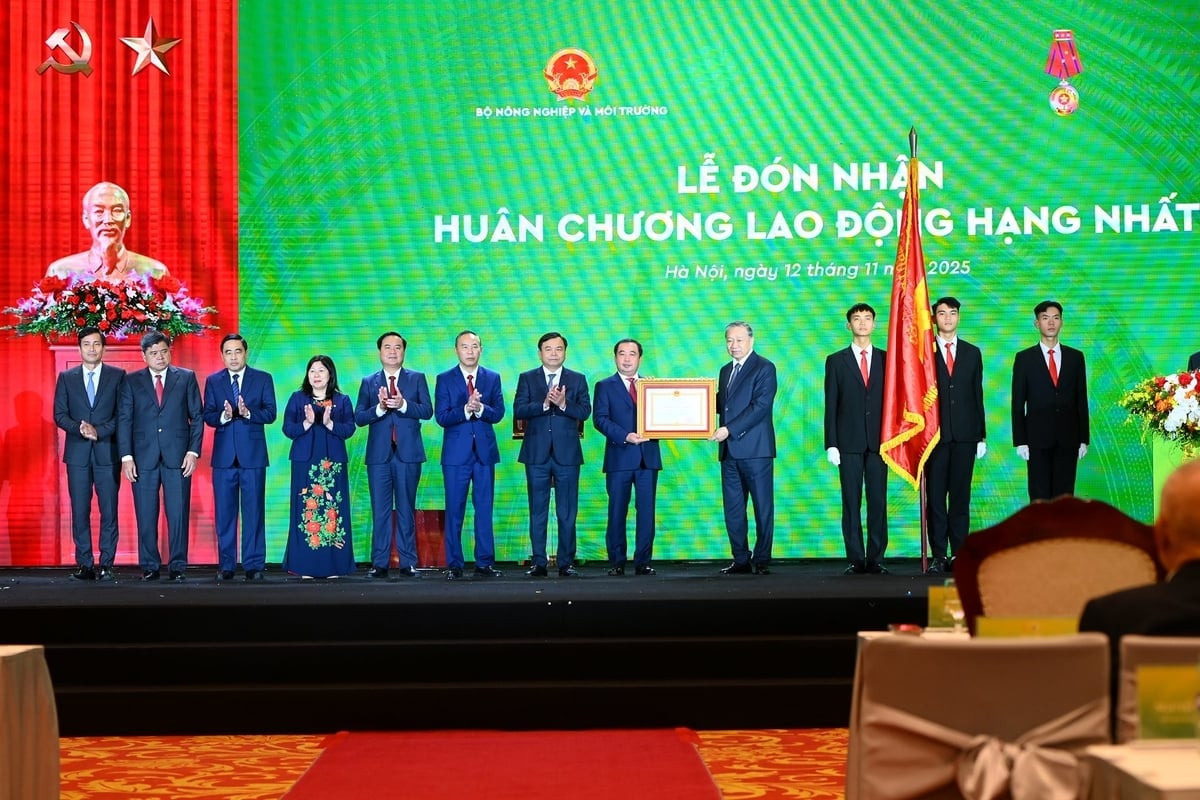
General Secretary To Lam, on behalf of the Party and State leaders, presented the First Class Labor Medal to the Ministry of Agriculture and Environment. Photo: Tung Dinh.
This is not only an opportunity for us to review the glorious tradition and show gratitude to generations of cadres, civil servants, public employees and workers, but also a time for the whole industry to reflect on itself, arouse pride, consolidate and spread confidence, the will and aspiration to rise up, proactively enter a new stage of development with the spirit of innovation, creativity and the highest responsibility before the Party, State and People.
The Agriculture and Environment sector has a special strategic position, closely linked to land, rivers, forests, mountains, villages, cities, islands, etc., with the lives of more than one hundred million Vietnamese people. This is the sector that manages the country's vital resources such as land, water, air, forests, minerals, biodiversity and ecological environment. Every inch of land, every river, every forest, every sea is not only a space for survival and livelihood development, but also an element of national sovereignty.
Therefore, agricultural development and protection of resources and environment are not only economic tasks, but also political, cultural, social, security and defense tasks.
On behalf of the Party and State leaders, I would like to send my warm regards, deep gratitude and best wishes to the leaders and former leaders of the sector through the periods, generations of cadres, civil servants, public employees, workers in the Agriculture and Environment sector, intellectuals, businessmen and farmers across the country.

General Secretary To Lam emphasized: Developing agriculture and protecting natural resources and the environment is not only an economic task, but also a political, cultural, social, security and defense task. Photo: Tung Dinh.
Dear comrades, after 80 years of construction, fighting and growing, the Agriculture and Environment sector has always accompanied the history of the nation.
Immediately after the country gained independence, in the especially difficult context of 1945, President Ho Chi Minh launched the movement "Increasing production, practicing thrift", affirming that agriculture was the leading front.
During the two long resistance wars, Vietnamese farmers "plowed one plow and one gun the other", both producing and fighting, ensuring food for the frontline and the rear with the slogan "five tons of rice to contribute to fighting the Americans", making an important contribution to the victory of national liberation and national reunification.
Entering the period of renovation, with the Contract 10 policy and the change in thinking about the role of farmers, Vietnam's agricultural production has changed dramatically. From a country with chronic hunger, Vietnam has become one of the world's leading agricultural exporters, such as rice, coffee, pepper, etc., making an important contribution to the trade surplus, creating a large source of foreign currency and stabilizing the macro economy.
With more than 60% of the population living in rural areas, the face of Vietnam's countryside has changed dramatically in the process of urbanization, especially through the National Target Program on New Rural Development and Sustainable Poverty Reduction. The infrastructure system from transportation, electricity, schools, and stations has been increasingly completed and synchronized. The legal system on land, water resources, minerals, and the environment has been gradually formed and completed.
In particular, the merger of the Ministry of Agriculture and Rural Development with the Ministry of Natural Resources and Environment to form the Ministry of Agriculture and Environment demonstrates a new development mindset of comprehensive resource management and agricultural development in a unified and organically linked direction.
Mapping, geological survey, forest and marine management, and biodiversity have made great progress. Environmental protection has shifted from passive treatment to proactive prevention and control. Vietnam has made strong commitments and actions towards the goal of net zero emissions by 2050, demonstrating our responsibility to the international community and to future generations; Developing a green economy, a circular economy, and renewable energy are becoming the main trends in the national development strategy.
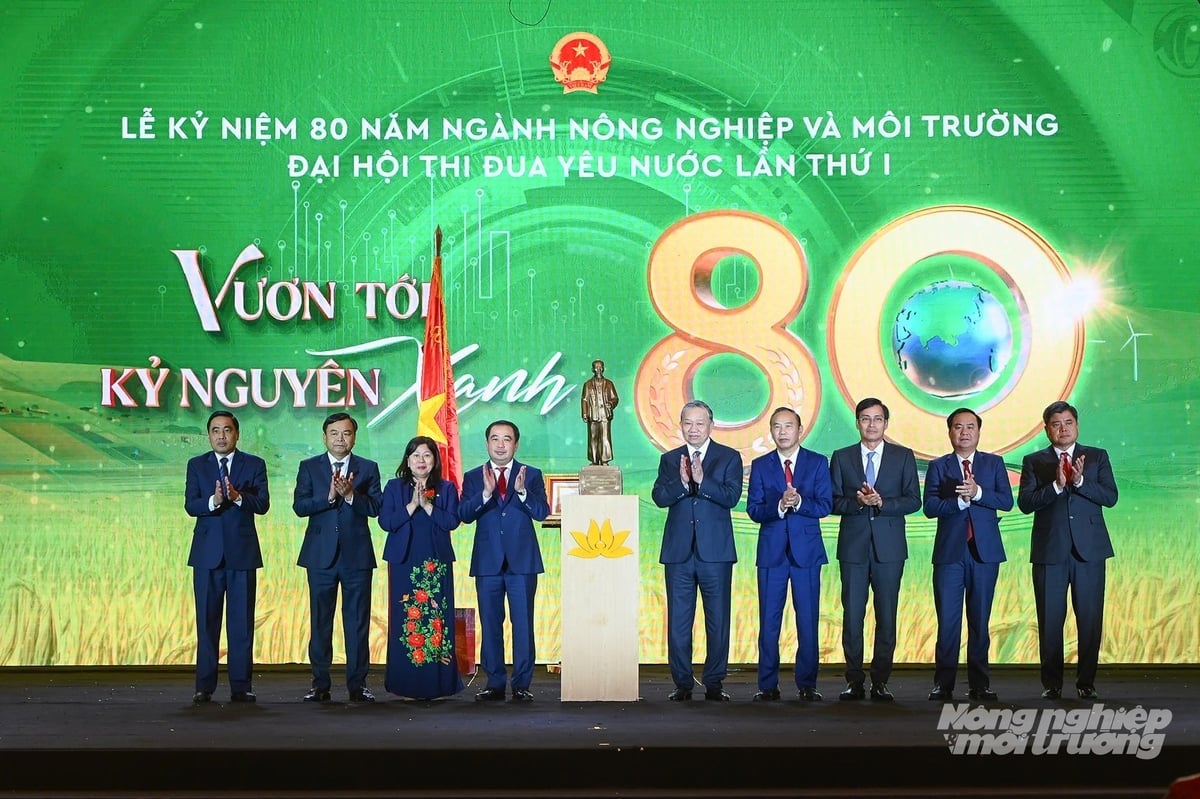
General Secretary To Lam said that the merger of the Ministry of Agriculture and Rural Development with the Ministry of Natural Resources and Environment to form the Ministry of Agriculture and Environment demonstrates a new development mindset of comprehensive management of resources and agricultural development in a unified and organically linked direction. Photo: Tung Dinh.
It can be affirmed that, over the past 80 years, the Agriculture and Environment sector has always accompanied the nation and become the pillar of the economy, the foundation of livelihood and now continues to be an important factor in the typical national development in the new era of development. Those great achievements are the crystallization of the intelligence, efforts and enthusiasm of generations of cadres, civil servants, workers, farmers, intellectuals, and Vietnamese enterprises, together with the attention and wise leadership of the Party and State.
On behalf of the Party and State leaders, I respectfully commend the achievements that all cadres, civil servants, public employees and workers in the Agriculture and Environment sector have achieved through patriotic emulation movements in the 2020-2025 period, as well as throughout 80 years of construction, growth and development of the sector.
Congratulations to the Ministry of Agriculture and Environment for being awarded the First Class Labor Medal by the Party and State. Congratulations to the typical advanced collectives and individuals in the Agriculture and Environment sector who were honored at today's solemn ceremony.
Dear comrades,
Besides the very proud results, we also need to look straight at reality: the Agriculture and Environment sector is currently facing many difficulties and major challenges, especially the contradictions and interweaving between economic development, resource management and environmental protection.
Firstly, natural resources are rapidly depleting, the carrying capacity of the environment in many places has reached its limit. Land - the nation's special means of production - is still being wasted, fragmented, and lacking overall planning; minerals are still being lost, exploited unsustainably, and water resources are declining in both quantity and quality.
Many rivers and underground water sources are being polluted and depleted; biodiversity continues to decline; environmental pollution, especially air pollution, water pollution, and solid waste in urban areas, industrial zones, and craft villages, remains complicated, seriously affecting people's health and lives and the country's sustainable development.
Second , the impacts of climate change and extreme natural disasters are increasingly severe, causing great damage to people and property, especially in the plains, coastal and mountainous areas. Droughts, saltwater intrusion, storms, floods and landslides occur with increasing frequency and intensity, are difficult to predict, and pose a direct threat to national food security and ecological security.
Third, our country's agriculture is still not developing sustainably, the added value is still low, farmers' lives are still difficult, the gap between rural and urban areas is still large. Production is still small and fragmented; processing industry and supporting services, logistics develop slowly; the connection between enterprises, cooperatives and farmers is not tight. Infrastructure, public services, social welfare in rural areas are not synchronous; rural cultural life in some places is still limited, there are signs of "leaving agriculture, leaving home", lacking successor forces.
Third, there are still many shortcomings in the institutions and management capacity. The legal system on land, resources and environment is still overlapping and lacking in uniformity; the organization of law enforcement in many places is not strict, allowing waste, negativity and group interests in planning, management and exploitation of resources to still occur.
The digitization of data on natural resources and agriculture is still slow and unsynchronized; agricultural extension and public services have not reached the grassroots level; science, technology and innovation have not really become the main driving force for development. Decentralization and delegation of power are still not linked to resource allocation and implementation responsibility.
Institutional, resource, environmental, and climate change limitations, along with inherent shortcomings in agriculture and rural areas, are becoming major bottlenecks that hinder the goal of rapid and sustainable development. This is not only an economic and technical issue, but also a political, social, security, and ethical issue, requiring us to have a strategic vision and take stronger, more decisive action in the new period.
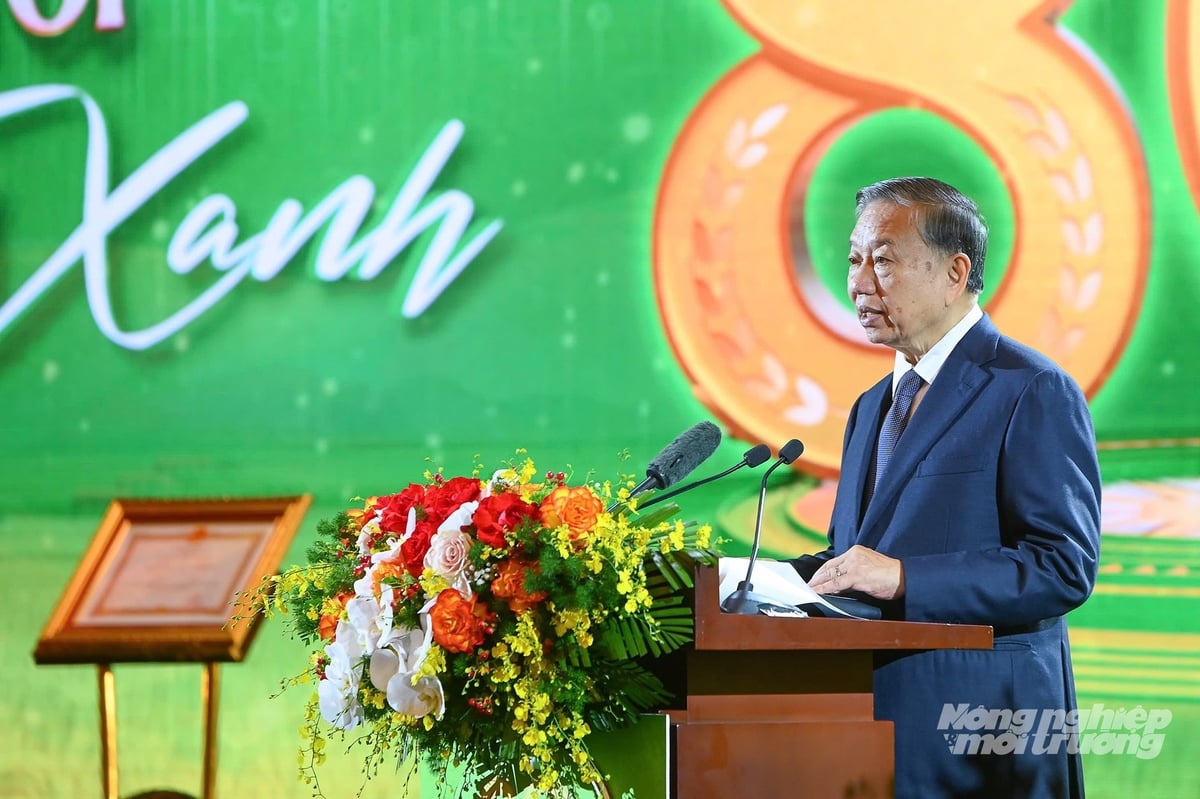
General Secretary To Lam commented: The limitations and shortcomings require us to have a strategic vision and take stronger and more decisive actions in the new period. Photo: Tung Dinh.
Dear comrades,
Faced with the requirements of the cause of national construction and defense, when opportunities and challenges are intertwined, the Agriculture and Environment sector needs to continue to innovate, act more decisively and effectively, and make worthy contributions to the success of the 14th National Party Congress, contributing to the country's prosperous and sustainable development.
I emphasize the following key directions and tasks:
Firstly , continue to improve institutions, policies and strategic foundations in the new period. Improve the quality of practical summaries, fully institutionalize the Party's policies on "agriculture, farmers, rural areas", on resource management, environmental protection and climate change response into the legal system.
Continue to synchronously and efficiently complete laws on land, water resources, minerals and environmental protection, ensuring the synchronization and harmony of interests of the State, people and enterprises. Land must continue to be identified as a special national asset, owned by the entire people, managed by the State; its use must be for the right purpose, effective, public and transparent;
It is necessary to establish a mechanism to strictly control power and be transparent in planning, land allocation, land leasing, land use conversion, and resource exploitation to avoid loss, corruption, and group interests.
Second, it is necessary to promote the development of science and technology, innovation, and digital transformation, considering this as a key driving force for development. Effectively implement Resolution No. 57 on the development of science and technology, innovation, and national digital transformation in the fields of agriculture and environment. Build a synchronous data system on land, water resources, forests, hydrometeorology, and biodiversity; develop digital maps of sectors and a unified land database nationwide.
Bring science and technology into the heart of agricultural production, from plant varieties, livestock, biotechnology, automation to traceability and digital commerce. Encourage models linking scientists, businesses, cooperatives, and farmers to participate, linking added value with production facilities, not just stopping at slogans and movements.
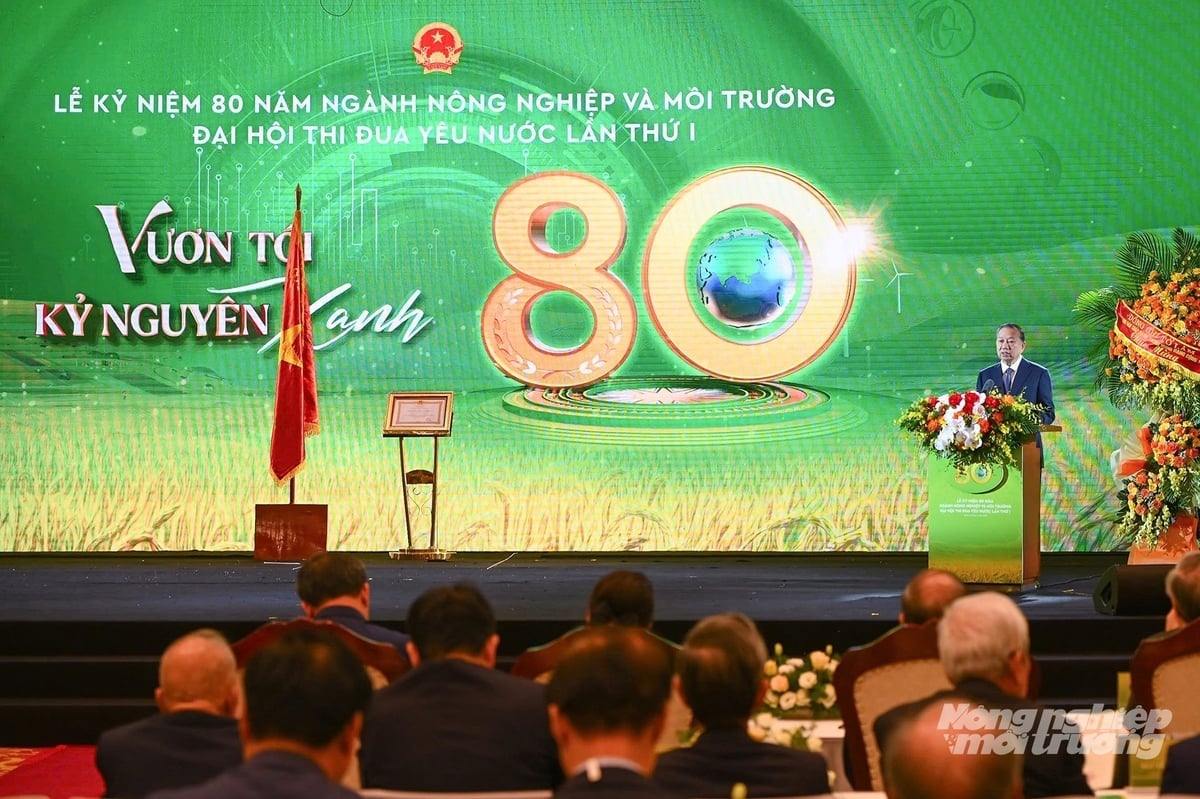
General Secretary To Lam said that the agriculture and environment sector needs to continue to innovate, act more decisively and effectively, and make worthy contributions to the success of the 14th National Party Congress, contributing to building a prosperous and sustainable country. Photo: Tung Dinh.
Third , planning, managing and effectively using resources. Protecting the living environment, considering resources as national assets must be strictly managed, allocated reasonably, economically, effectively and sustainably. Water resources are vital to food security, ecological security and national security, and need to be strictly managed and fairly regulated. It is necessary to restore river, lake and groundwater ecosystems, control pollution, and proactively adapt to climate change, especially in the Mekong Delta, North Central, Central Highlands and coastal areas.
It is necessary to upgrade irrigation systems, dykes, and reservoirs; apply technology to forecast and prevent landslides and salinity; restore protective forests, headwater forests, conserve biodiversity and natural ecosystems, link conservation with sustainable development, and make nature accompany and develop together. It is necessary to completely handle environmental pollution hotspots in large cities, industrial zones, craft villages, and rivers; prevent new sources of pollution, and improve the quality of people's living environment.
Fourth , unblock resources; strongly reform administrative procedures; promote the strength of people and businesses; thoroughly handle bottlenecks , complicated and overlapping procedures in land, resource and environmental management; remove difficulties in capital, land and technology for farmers and businesses.
Promote decentralization and delegation of power in conjunction with resource allocation and control; strongly mobilize social resources, enterprises, cooperatives and the private economy to invest in green agriculture, processed agriculture, renewable energy, and circular economy. Turn natural resources, especially land, forests, seas, and water, into material, infrastructure, and financial values for national development.
Fifth , restructuring the agricultural sector towards increasing added value and sustainable development. The agricultural sector needs to shift from extensive to intensive development, from increasing output to improving productivity, quality and efficiency; promoting brand building, strongly developing ecological agriculture, organic agriculture, circular agriculture, applying high technology; linking production with deep processing, with building national brands; expanding markets, participating more deeply in the global agricultural value chain. Developing a new type of rural ecosystem: synchronous infrastructure, rich cultural life, clean environment, guaranteed security and order, building civilized and modern countryside.
Sixth , build a streamlined, effective and efficient organization; a team of dedicated, intelligent and people-oriented cadres. The Ministry of Agriculture and Environment needs to quickly perfect its organization, operate smoothly, improve management efficiency; build a team of honest, professional, dedicated, impartial and responsible cadres and civil servants.
Strengthen training and development of cadres and experts in the fields of agriculture, natural resources, environment and climate. In particular, attach importance to grassroots cadres and agricultural extension forces who not only propagate but are the “extended arms” of science and policy to each field and each farmer household.
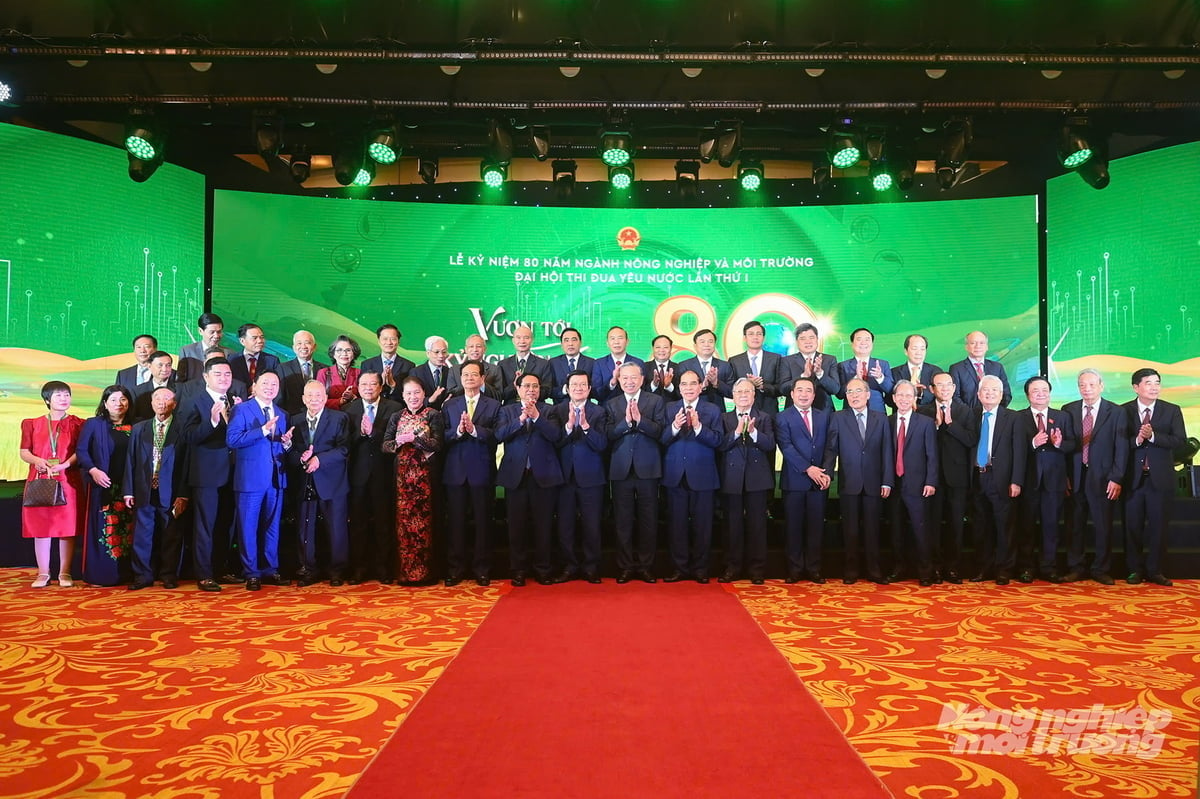
General Secretary To Lam and other Party and State leaders and former leaders took a souvenir photo with leaders and former leaders of the Ministry of Agriculture and Environment. Photo: Tung Dinh.
Dear comrades,
80 years is a glorious journey, although there are greater responsibilities ahead, I believe that the Agriculture and Environment sector will continue to promote its glorious tradition, strongly innovate its thinking, act decisively and effectively; dare to think, dare to do, dare to take responsibility; unite, make the highest effort to make worthy contributions to the common success of the country.
I call on all cadres, civil servants, public employees, workers in the industry, scientists, businesses, cooperatives and farmers nationwide to continue to unite and be more creative, successfully achieve the set goals; successfully build the model of "ecological agriculture, modern countryside, civilized farmers". Manage, exploit and effectively use natural resources, protect the ecological environment; preserve every river, every inch of land, every forest, every mountain, and the sacred sea of the Fatherland.
Building a rich and beautiful country, improving the material and spiritual life of the people, contributing more and more to the rapid and sustainable development of the country.
I wish you health, happiness and success!
Source: https://nongnghiepmoitruong.vn/tong-bi-thu-to-lam-nganh-nong-nghiep-va-moi-truong-luon-dong-hanh-cung-dan-toc-la-tru-cot-nen-kinh-te-d783839.html





![[Photo] Highways passing through Dong Nai](https://vphoto.vietnam.vn/thumb/1200x675/vietnam/resource/IMAGE/2025/11/12/1762940149627_ndo_br_1-resize-5756-jpg.webp)


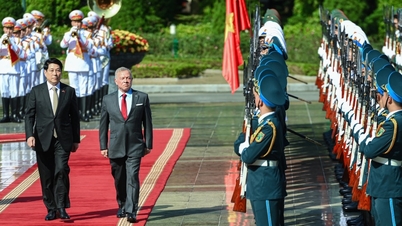

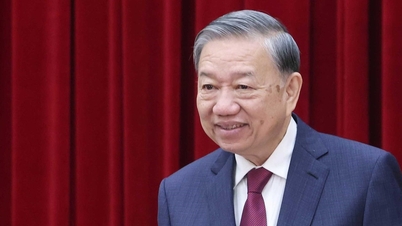

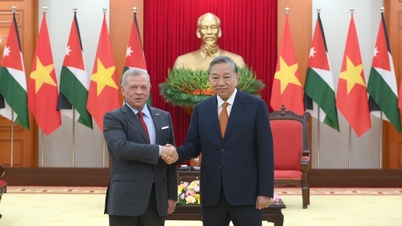

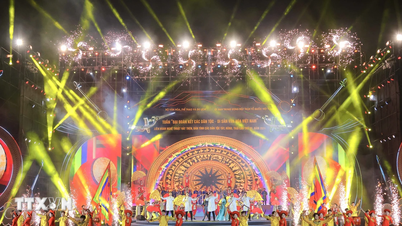

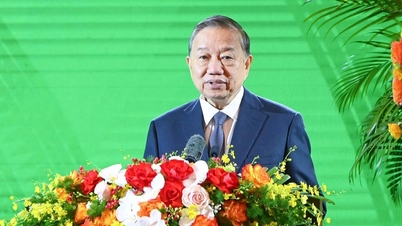


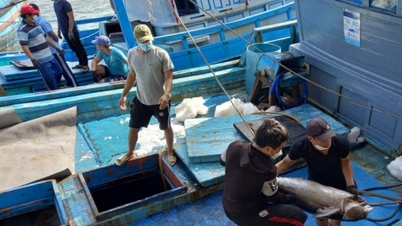



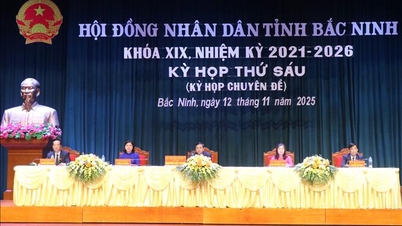
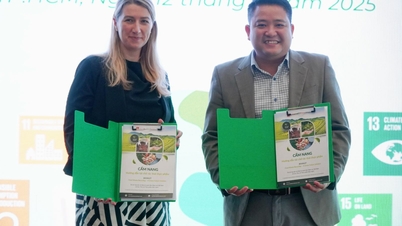
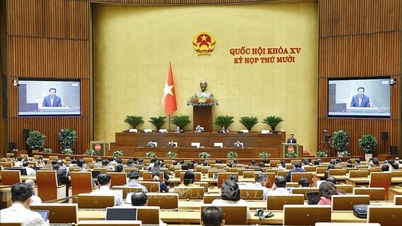




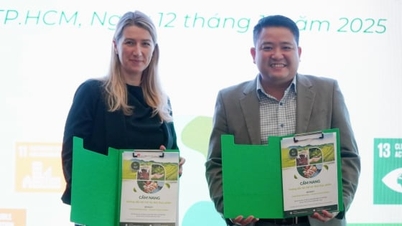
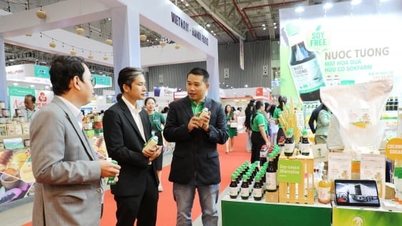


![Oil and Gas Industry - Clean Fuel for Green Transportation: [Part 3] Joining Hands to Reduce Emissions](https://vphoto.vietnam.vn/thumb/402x226/vietnam/resource/IMAGE/2025/11/12/1762947361926_nha-may-loc-dau-dung-quat-082910_572-183540.jpeg)
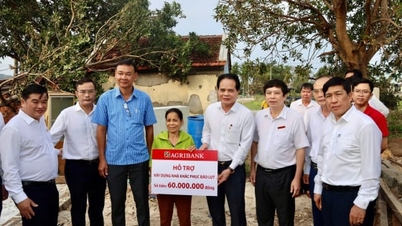






































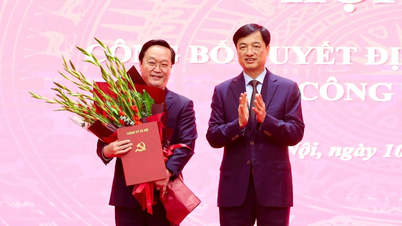



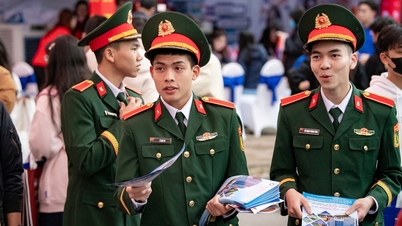
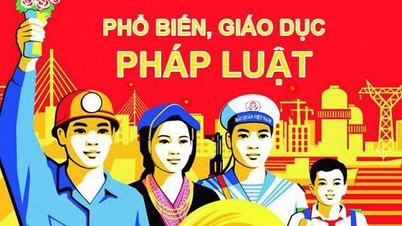

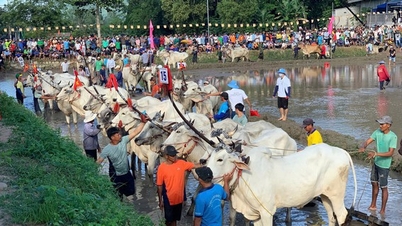

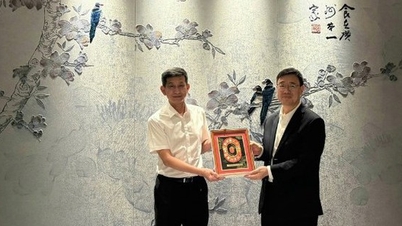







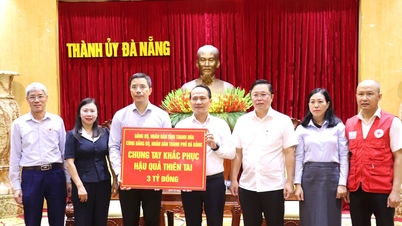







![Dong Nai OCOP transition: [Article 3] Linking tourism with OCOP product consumption](https://vphoto.vietnam.vn/thumb/402x226/vietnam/resource/IMAGE/2025/11/10/1762739199309_1324-2740-7_n-162543_981.jpeg)






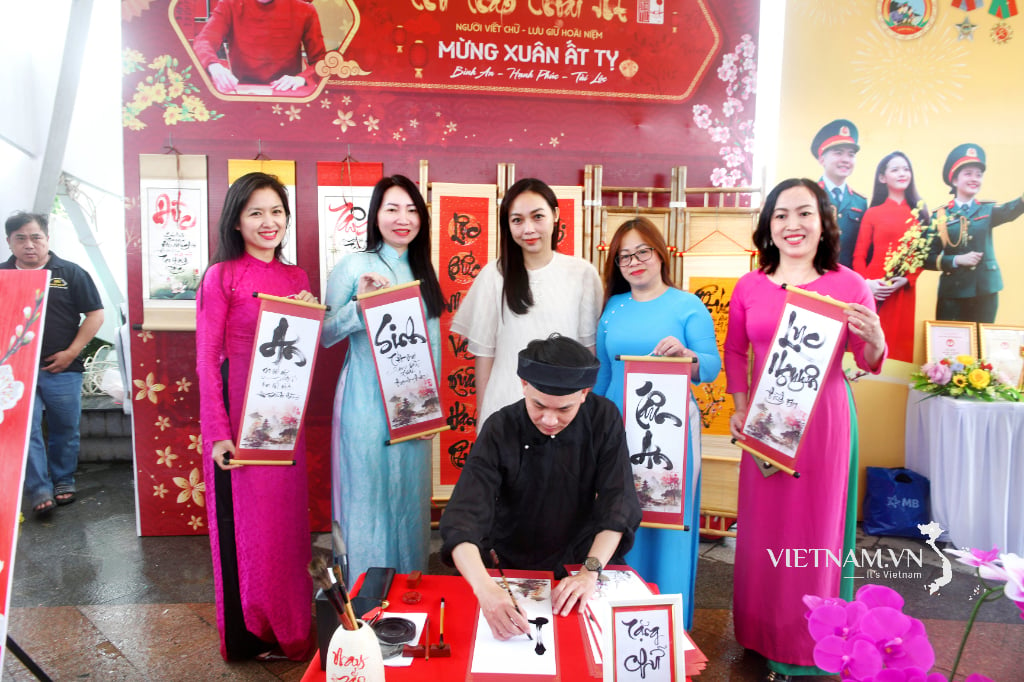
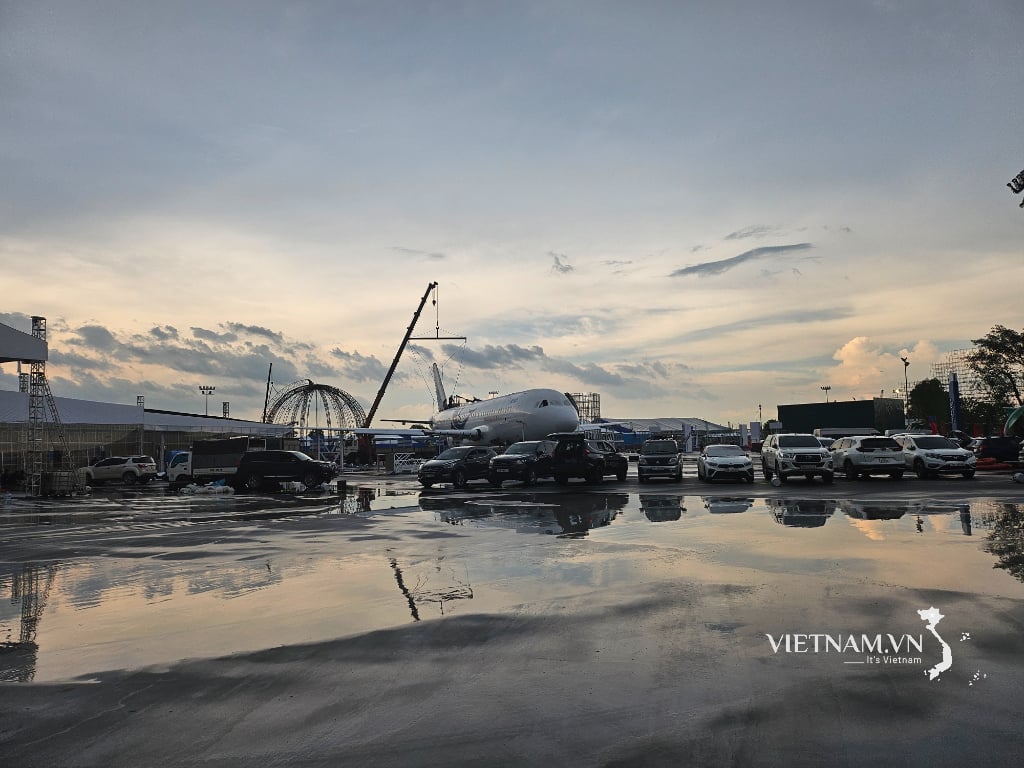
Comment (0)